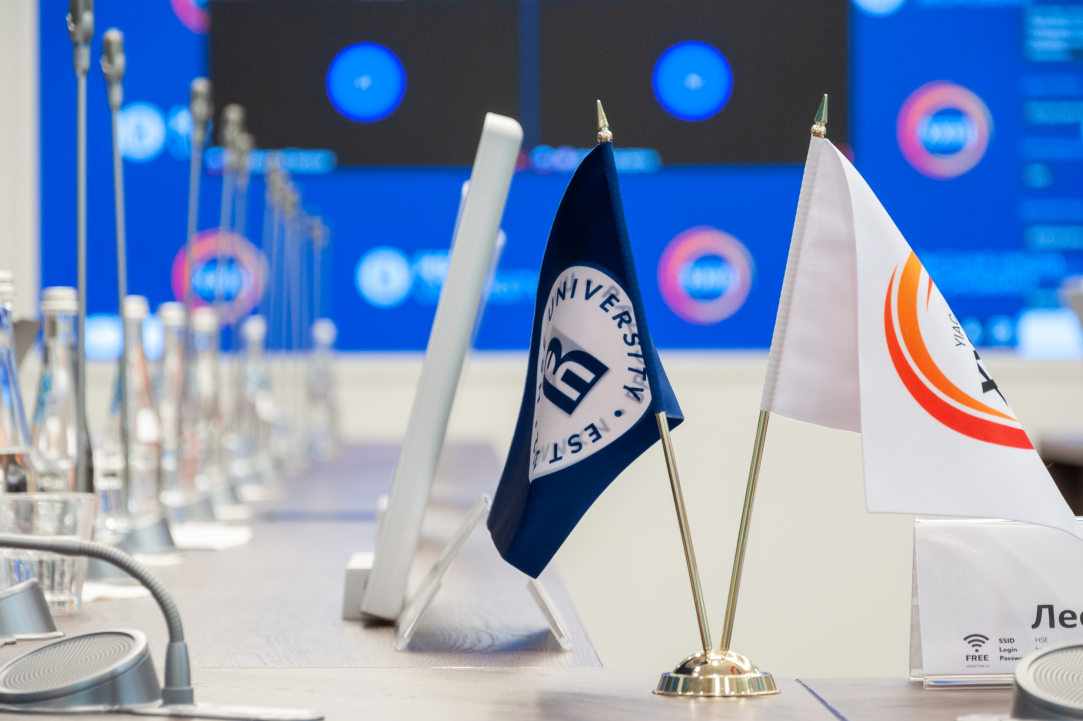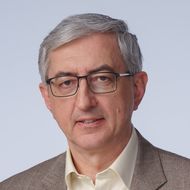Representatives of More than 30 Countries Took Part in the XXIII Yasin International Academic Conference

The XXIII Yasin (April) International Academic Conference on Economic and Social Development has come to a close at HSE University. In 2022, more than 3,000 participants took part in the event, including 250 registered foreign representatives—almost 10% more than last year.
International scholars presented 77 reports. Many of the foreign speakers were from the USA, China, Italy and Belarus. Representatives from Germany, India, Kazakhstan, South Korea, Poland, Turkey, Chile, South Africa and other countries also took part in the conference.

Ivan Prostakov, HSE University Vice Rector
‘This year, the Yasin Conference managed not only to maintain its international focus, but also to qualitatively transform it, even in difficult geopolitical conditions. The conference was held in a hybrid format: some of the events took place on-site and some were held online, which has become common for us. This allowed us to significantly expand the number of participating countries. Previously, participants from about two dozen countries attended the conference. Now, thanks to the online format, scholars and experts from more than 30 countries took part in the XXIII Yasin Conference.’
At the conference, experts discussed various topics related to economic and social development in Russia and worldwide. Foreign participants presented academic papers in sections devoted to innovations in education, international relations, pandemic challenges, sustainable development, climate change and many others. Several meetings and round tables were dedicated to cooperation between BRICS countries and integration processes within the EAEU. As for the HSE University expert reports that are traditionally presented at the conference, the report ‘Assessing Integrated Processes in EEU Trade Operation: Integration Index – 2022 and Short-term Modifying Trends (EEU+)’ was prepared together with experts from Armenia, Belarus, Kazakhstan, and Kyrgyzstan.
Leading international scholars presented their reports at the XXIII Yasin (April) International Academic Conference on Economic and Social Development. Ronald Fisher, Professor of Psychology at Victoria University of Wellington, spoke about approaches to cross-cultural research. Jan vom Brocke, Professor of Business Informatics at the University of Liechtenstein, presented the report ‘Process Science – Towards the Interdisciplinary Study of Change’. He noted that so far, processes have been studied from the point of view of particular disciplines, while science should focus on combining and synthesising theories and methods. Malcolm Fairbrother, Professor of Sociology at Umeå University, presented a paper on the causes and consequences of political trust from the point of view of existing key theoretical approaches.
In addition, Jonathan Larry Calof, Professor at the Telfer School of Management at the University of Ottawa, made a report on foresight research in Canada.
A round table in memory of the outstanding Hungarian economist János Kornai, former president of the International Economic Association, was held as part of the conference. Gergely Kenedi from Corvinus University of Budapest delivered the report.
The Yasin (April) International Academic Conference on Economic and Social Development is the largest interdisciplinary conference on social sciences held in Russia, both by number of participants and research community representation.
The conference’s partners include Russia 24, Business FM, the Interfax News Agency, ‘Expert’ magazine, ‘Rossiyskaya Gazeta’, Public Television of Russia, Finam.ru, Polit.ru, the Agency for Social Information, Indicator.ru , the Science and Education Policy Telegram channel, Strategy Journal, the Ekonomika I Zhizn nationwide newspaper, the Business and Society journal, the Nauka TV Channel, InScience.News, Econs.online, Invest-Foresight and others.
See also:
HSE University Announces Call for Proposals to Attend Anniversary Yasin Conference
HSE University invites submissions of proposals with academic reports for participation in the 25th Yasin (April) International Academic Conference (YIAC). The conference programme, centred on five research themes addressing issues of economic and social development, will retain its interdisciplinary focus and welcome participation from leading scientists in Russia and around the globe. The key events of the 25th Yasin Conference will be taking place in Moscow from April 15 to 18, 2025.
25th Yasin (April) International Academic Conference Now Accepting Proposals
Reports on new research results will be presented and discussed as part of the conference’s sections. These reports will be selected based on reviews of proposals. As always, the conference programme features expert discussions of the most pressing economic, social, internal and external issues in the format of roundtables and associated events.
Academic Council: HSE University’s Contribution to Achieving National Goals and Development Priorities to Increase
HSE University’s Development Programme until 2030 will be improved in order to increase the university’s contribution to achieving national goals and implementing the priorities of the country’s scientific and technological development. This decision was made by the university’s Academic Council on April 26. The meeting also addressed the principles for the development of HSE University’s external communications, one of which is the creation of a high-quality information field around the university.
Keeping Up with the Neighbours: Envy as a Driver of Economic Growth
Classical economic theory assumes that economic agents are entirely self-interested and rational in their pursuit of material well-being, and that they are not affected by external factors. As a result, externalities are not considered in any way when constructing economic models. Nevertheless, some sociologists argue for a revision of modern economic theory to incorporate the ethical dimensions of economic agents' behaviour. Kirill Borissov, Professor of the Faculty of Economics at the European University in St Petersburg, spoke at the XXIV Yasin (April) International Academic Conference and shared his observations from creating his own economic model incorporating the factor of envy.
Structural Transformation and Drivers of Sustainable Growth in Russian Economy Discussed at HSE University
The Russian economy has demonstrated high resilience to unprecedented external pressure and has managed to largely adapt to new conditions. As early as this year, it can go from recession to growth. The issue of where to find drivers and resources for this was discussed at a plenary session titled ‘Russian Economy under Sanctions: From Adaptation to Sustainable Growth’ at the XXIV Yasin (April) International Academic Conference held at HSE University as part of the Decade of Science and Technology. Minister of Economic Development of the Russian Federation Maksim Reshetnikov took part in the discussion.
‘People Want to Receive Only Useful Content’
Experts say that interest in news has sharply increased among the Russian audience. At the same time, part of the audience deliberately avoids it. What kind of content is in demand and will people continue to watch TV? These and other issues were discussed at the plenary session ‘ Info-hygiene and Information Elitism: How to Consume Media Properly’ at the XXIV Yasin (April) International Academic Conference.
'The Emerging Trends in Africa Will Shape the World Order, and We Need to Be Prepared for That'
Africa has the potential to become a new economic giant. Today, African countries are interested in comprehensive cooperation and strengthening their positions in the global arena, and they look forward to receiving assistance from Russia and China in developing their technology, economy, and social sphere. Effective engagement with Africa requires training a greater number of professional African studies specialists. The XXIV Yasin (April) International Academic Conference at HSE University featured a plenary session on 'Africa in a Changing World'.
Learning a Foreign Language Can Delay the Onset of Dementia
Dementia, a debilitating form of cognitive impairment, can be preventable. According to Professor Jubin Abutalebi of the University Vita Salute San Raffaele, Italy, and the Arctic University of Tromsoe, Norway, the easiest way to prevent cognitive decline after the age of 60 is to learn and practice foreign languages – the more languages, the better, suggests Professor Abutalebi in his presentation 'Preventing dementia through bilingualism' at the XXIV Yasin (April) International Academic Conference.
‘The BRICS Strategic Partnership Offers the World Creative, Unifying, Forward-Looking Initiatives’
Today, BRICS has become an influential factor in modern international relations and is perceived as one of the pillars of a more just world order. This association is not based on one party’s dominance, but instead, is built on a sound balance of interests. The role of the association was discussed by the participants of the plenary session ‘BRICS Development Strategy: Equal Opportunities in an Unequal World’at the XXIV Yasin (April) International Academic Conference.
Sanctions Create New Opportunities for Russian Companies
Like any crisis, the sanctions of 2022, besides problems, have created new opportunities for Russian companies. This is the conclusion that HSE University’s experts have come to. Their study results are presented in the report ‘Adaptation of Russian Industrial Companies to Sanctions: First Steps and Expectations’, prepared by HSE University for the XXIV Yasin (April) International Academic Conference.


